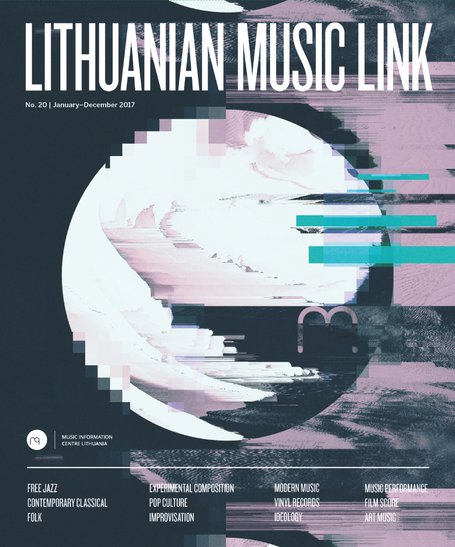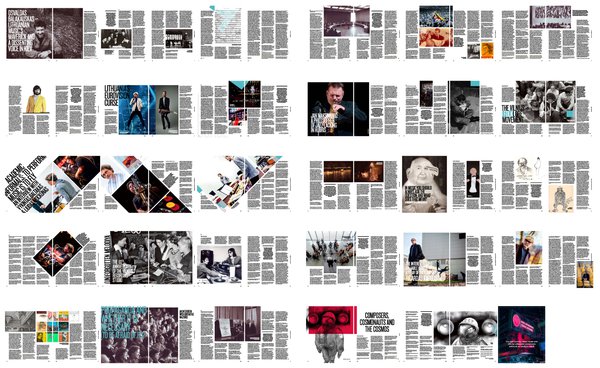Sixty pages to Lithuanian Music Link – Issue No. 20
- Jan. 7, 2018
‘Almost 20 years ago Music Information Centre Lithuania began to publish the newsletter Lithuanian Music Link, with the aim of presenting the most up-to-date news about Lithuanian music and its most distinctive personalities to readers abroad, while also taking on themes of fundamental importance. In this regard the twentieth issue is perhaps the most fundamental and the most historical. Besides that, it has the largest number of sharp-edged commentaries, even satire, taking into account the fact that Lithuanian Music Link has basically always adopted a positively promotional tone in presenting Lithuanian music,’ says Asta Pakarklytė, the director of Lithuanian Music Centre Lithuania.
Over the last two decades of publication it has been observed with differing degrees of intensity that the content of Lithuanian Music Link is also important for the national audience and for that reason the texts and photographs in the publication are also published in both Lithuanian and English on the Music Information Centre Lithuania website. The texts in English were translated by the literary translator Romas Kinka.
Lina Navickaitė-Martinelli, a co-editor of Lithuanian Music Link assert that ‘One of the greatest pleasures in preparing the journal is that, on reaching the finishing line, the articles not only sit one next to another, but seem to interweave in ways that are difficult to grasp, resonate with and speak to one another. No, it’s not some mystical process – of course, we think about the themes, the characters involved and how they link up with each other over the year of preparation leading up to publication. However, it isn’t possible to foresee some things in advance, and for those surprises that sometime arise we are grateful to both our authors and the heroes of their texts. And the heroes are the names and the events (historical and contemporary) at which we try to look not just and not necessarily with the aim of showing the reader “how good things are in the musical life of Lithuania”, but more in an effort to open up and reveal more of the layers, variables, and colours.’ In this latest issue there are several portraits of composers. The contours of the personality of Lithuanian music’s maverick and dissenting voice Osvaldas Balakauskas are delineated by Gražina Daunoravičienė with the help of the reminiscences of his colleagues from his time studying in Kiev and his participation in the so-called ‘night universities’. Laima Slepkovaitė turns her gaze on Lithuanian’s philosopher of jazz Jan Maksimowicz, while Jūratė Katinaitė turns hers on Lithuania’s apostle of music Donatas Katkus. Linas Paulauskis reveals the intensity of the composer Ričardas Kabelis, who has had his finger on the pulse of musical radicalism for several decades.Karolis Vyšniauskas in his text discussed the pluses and minuses of Eurovision: ‘Lithuania has never won Eurovision but the competition has changed our country’s pop music scene irrevocably – and introduced an inferiority complex into Lithuanian society. How did Europe’s most enjoyable music show become such a serious matter here?’ The philosopher Gintautas Mažeikis, an assiduous theorist of propaganda, discusses with Edvardas Šumila the premises of music propaganda, the creative power (or lack of power) of Soviet Lithuanian propaganda, the technologies involved in propaganda and their need today.
Both Rūta Skudienė and Austė Nakienė take a backward glance in their respective texts: the first, at the era of the Vilnius recording studio and its important work; the latter, at the directions taken by the Lithuanian ethnic culture movement towards the urban environment. Ugnius Babinskas talks to the ‘academic informals’ Vykintas Baltakas and Liudas Mockūnas with the aim of finding out from them what the best ‘recipes’ for performing contemporary music are.An unexpected author published in the journal is Herkus Kunčius – a post-modern essayist, called by some critics of a more nervous disposition a scandalous and provocative Lithuanian writer, whose short satire was inspired by an event in the 1960s when German Titov, the second cosmonaut to go into space, visited Lithuania, occupied at the time by the Soviet Union, including in his schedule a meeting with representatives of the Composers’ Union of the Lithuanian SSR.
Lithuanian Music Link is one of the initiatives to promote Lithuanian musical culture internationally, made possible by financial assistance from the Association LATGA, the Lithuanian Council for Culture and the Ministry of Culture of the Republic of Lithuania.
Translated from the Lithuanian by Romas Kinka
Information from Music Information Centre Lithuania



